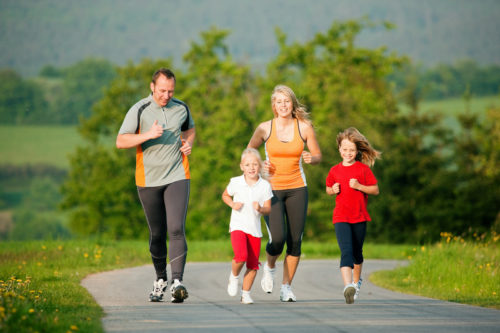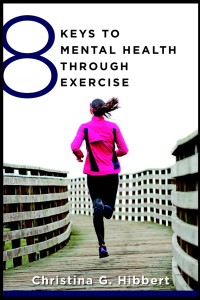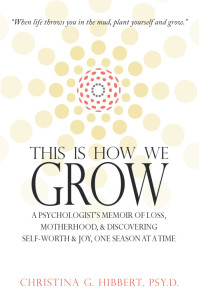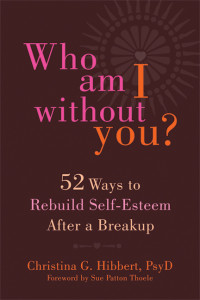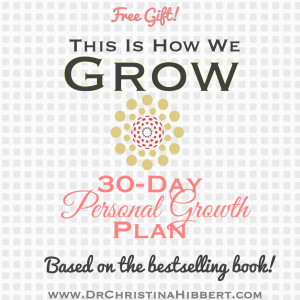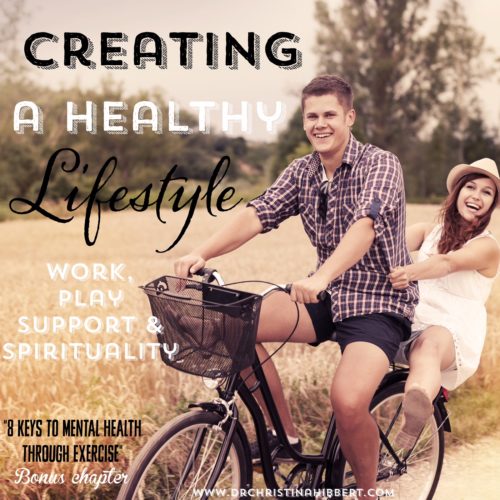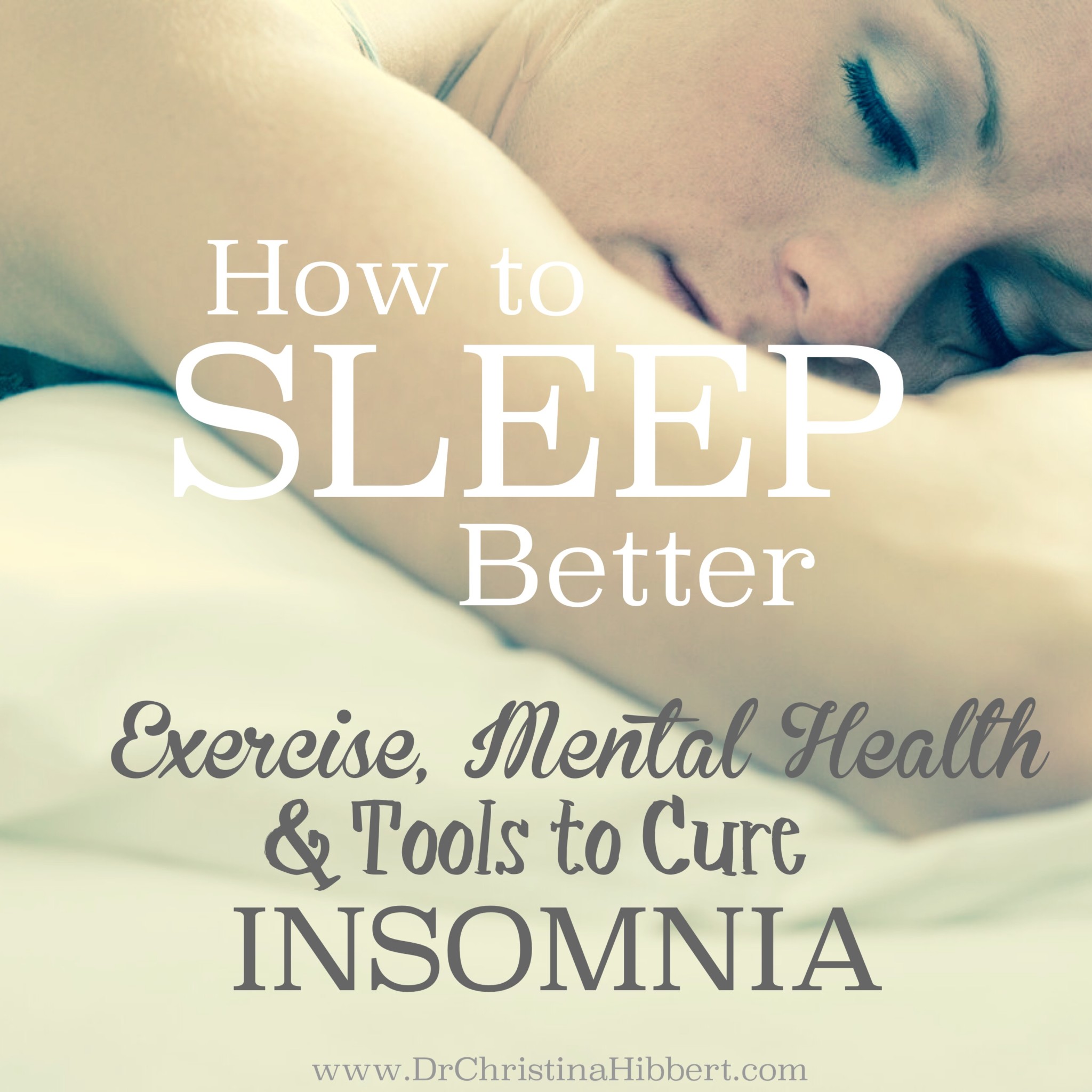
09 Nov How to Sleep Better- Exercise, Mental Health & Tools to Cure Insomnia (Bonus Chapter from New Book!)
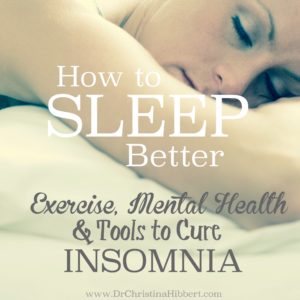 We live in a sleep-deprived culture. Too many people fail to grasp the absolute necessity of adequate sleep; and chronic insomnia can impact our health drastically. Insomnia is associated with high blood pressure, fatigue, weight struggles, and memory loss. It’s also associated with higher rates of anxiety, depression, stress, worry, poorer thinking, decision-making, and judgment, and overall, poorer coping (Heffron, 2014).
We live in a sleep-deprived culture. Too many people fail to grasp the absolute necessity of adequate sleep; and chronic insomnia can impact our health drastically. Insomnia is associated with high blood pressure, fatigue, weight struggles, and memory loss. It’s also associated with higher rates of anxiety, depression, stress, worry, poorer thinking, decision-making, and judgment, and overall, poorer coping (Heffron, 2014).
Sleep is as crucial to mental health as it is to physical health; maybe even more so. It serves to restore the mind, gives us energy to handle life’s situations, and helps us manage our emotions. Healthy sleep is associated with greater energy, learning, performance, and better overall health (Sleep Institute, 2009). As I often say, “Sleep better, cope better.”
I have long struggled with sleep and know firsthand the connection it has to mental wellbeing. Because of this, I’ve studied and treated sleep disturbances in my practice for many years, helping those with depression or anxiety or chronic stress understand the connection to sleep, and facilitating the creation of healthier sleep beliefs and behaviors. I know that when I’m sleep deprived I’m grumpy, irrational, and just can’t seem to be nice! I have less energy, I’m less likely to exercise, and I’m not alone.
It is estimated that:
- 30-35% of adults have at least brief insomnia symptoms (Heffron, 2014).
- 15-20% are diagnosed with a short-term insomnia disorder, lasting less than three months (Heffron, 2014).
- 10% are diagnosed with a chronic insomnia disorder, lasting at least three months and occurring at least three nights per week (Heffron, 2014).
- For many, staying asleep is more of an issue than falling asleep. In one study of 6,781 people with insomnia, only 38% struggled to initiate sleep while 61% had trouble staying asleep. 52% of those with insomnia also reported waking up too early in the morning (Walsh et al., 2011).
- Without adequate sleep, we’re less likely to exercise. Disrupted sleep is correlated with a decreased desire to exercise and increased pain when exercising (Meney et al, 1998; VanHelder & Radomski, 1989).
- Conversely, exercise improves quality and duration of sleep (Reid et al., 2010).

Sleep Treatment
It’s estimated that four percent of adults in the U.S. use prescription sleeping pills each month (Heffron, 2014), and while these can be a helpful temporary fix under a doctor’s care, they can also have significant side effects and risks. Cognitive-behavioral therapy (CBT) is considered an effective treatment for insomnia since it focuses on changing the underlying beliefs related to sleep. The tools of using thought records [click here to learn how] can also be applied to sleep.
Exercise is considered one of the best treatments for sleep in the long run, however. Over time, exercise calms a person’s stress response, and this, in turn, leads to a greater readiness to fall and stay asleep.
Exercise & Sleep
It has long been recognized that exercise is associated with higher quality sleep in people of all ages (King et al., 1997; Reid et al., 2010). But how, exactly, does this relationship work?
It appears that sleep may actually have a greater impact on exercise than exercise has on sleep, at least at first (Reynolds, 2013). When starting an exercise program, the amount of sleep you’ve had the night before actually influences how long, or if, you’ll exercise the next day. Those who have trouble falling and staying asleep the night before are less likely to exercise the following day, and if they do exercise, they’re more likely to feel pain and fatigue and quit earlier (Baron et al., 2013).
Continued, regular exercise will eventually lead to better quality and duration of sleep, but it may not happen the first night. One study showed it took four months of regular exercise for insomniacs to experience positive changes in sleep (Reid et al., 2010), but don’t let that discourage you. The effects of exercise on your sleep will become obvious over time. It may take a month, or several months, but stick with it and you’ll be sleeping well (Baron et al., 2013). In fact, the benefits of exercise on sleep appear to be as good or better than most sleeping pills and other treatments (Reynolds, 2013), so stick with it!
Tips for Improved Sleep
- Make sleep a priority. Too many of us believe it’s okay to live a sleep-deprived life, but hopefully by now you can see this is flawed thinking. Make sleep a top priority in your life, focusing on ways to get to bed on time, to make up for lost sleep, and to let yourself rest when you need it.
- Sleep seven to nine hours a night, on average. The total recommended sleep time will vary somewhat based on age, health, stress, and other factors, but in general, seven to nine hours is ideal.
- Sleep debt is a real thing. When you’ve been getting too little sleep, you need to make it up if you want to be well. Taking naps, sleeping in on the weekends, and going to bed a little earlier a few times a week can all help you repay your sleep debt and get back on the healthy track.
- Practice good sleep hygiene. Adults need bedtime routines just as much as babies and children do. Make your bedroom comfortable, dark, and the right temperature to encourage sleep. Use your bed for sleep only, and refrain from doing mentally stimulating activities in your bedroom like work or even watching TV. Your mind and body need time to calm down and prepare for sleep, so begin your routine an hour before bedtime. Do calming activities, like reading, taking a bath or shower, listening to calming music, or whatever promotes sleep for you.
- Keep the same bed- and wake-times as much as possible, even on the weekends.
- Avoid “screen time” close to bedtime. It gets your mind stimulated and can lead to poorer sleep. Turn off the TV, computer, or phone well before bed to let your brain calm down.
- The more caffeine you consume, the poorer your quality of sleep and exercise will be. On the flip side, the more fatigued you are, the more likely you are to rely on caffeine to “wake up” in the day (National Sleep Foundation, 2009).
- Exercise at least three hours before bed. This gives the body several hours to regain a cooler temperature, which is associated with better sleep (National Sleep Foundation, 2009).
- Illness, stress, or even hormones can make you need more sleep, and many people feel sleepier in the winter months, as well. It’s a good thing to get a little extra sleep when your body’s craving it, so indulge!
- Oversleeping is another sleep issue that is has been linked to increased risk for diabetes, heart disease, headaches, obesity, depression, and even death. If you’re sleeping more than the recommended seven to nine hours per night, on average, consult your physician. She can help you determine what might be contributing to your sleep problems and recommend treatment options (Ratini, 2012).
- Use relaxation, essential oils, and other rest-promoting tools to improve quantity and quality of sleep. Join my FREE webinar on how essential oils can improve sleep--diffuse lavendar or a restful blend like Serenity at bedtime, in your own room and your childrens’; place a relaxing essential oil on the bottoms of your feet, back of the neck, or on your palms and cup your hands over your nose to inhale the rest-promting aroma. Or try a natural rest-promoting supplement, like Doterra’s Serenity blend, which is taken internally (more on Essential oils on my new “Motherhood Essentials” webpages and webinars). Other relaxation tools, like deep breathing, visualization, and progressive muscle relaxation, will promote healthier sleep when practiced regularly, too.
- And, of course, exercise regularly to build up a better quality and duration of sleep over time.
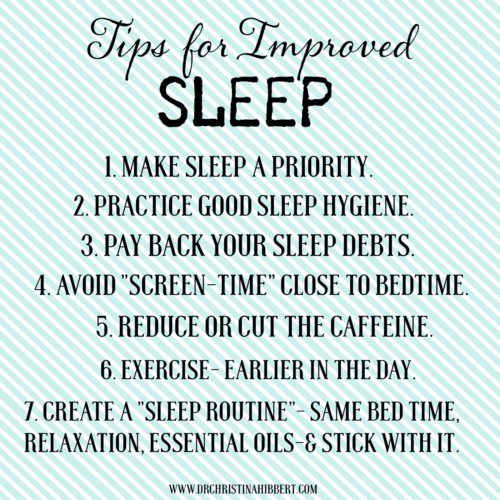
Additionally…
If you suffer from insomnia, like so many do, try these suggestions: (redirect to website)
- If thoughts, worries, and negative emotions flood you when you lie down to sleep, write them down and then “dream” yourself to sleep! Getting the thoughts or worries on paper gets them out of your head, reduces intense emotions, and gives you the chance to leave it ‘til morning and fall asleep easier. Then, instead of thinking of all the “negative” stuff before you fall sleep, focus on the good. Visualize your desires, hopes and vision for the future, and “dream” yourself to sleep. You’ll not only fall asleep smiling, you’ll sleep better and wake happier too!
- If you can’t relax enough to fall asleep, practice relaxation skills and only go to bed when you’re sleepy. If you’re not sleepy yet, engage in a calm activity (like reading, light housework, etc.) until you’re ready to lie down. Learn relaxation skills like deep breathing, meditation, and visualization, and then practice these skills for 10-30 minutes before bed. Listening to the same soothing music each night is also a good way to condition your body to relax into sleep.
- If you feel sleepy in the daytime and awake at bedtime, re-program your body to fall asleep on time. Limit caffeine and sugar after about three p.m. Set your alarm to start waking you up earlier. This should help you feel more tired at bedtime. If these aren’t working, your internal “clock” might be off. You can reset your circadian rhythms with light therapy. Sit in direct sunlight (either by a window or outside) in the early morning for 20-60 minutes each day for two weeks. If you don’t live in a sunny place, you can buy a light box for the same effect. Sunlight helps reset your body’s sleep patterns naturally, allowing you to fall asleep earlier and feel more rested in the daytime.
- If you fall asleep fine, then wake up in the middle of the night and fall asleep, “get up” to get back to sleep.After 15-20 minutes, if you’re unable to sleep, leave your bed and engage in a calm, quiet activity until you feel sleepy enough to try to fall asleep. Repeat as needed. Though it may not happen immediately (or even that same night), you’ll eventually get tired enough to sleep again.
- If you’re a clock-watcher, lying awake, counting the minutes of sleep you’ve lost and reminding yourself just how tired you’ll be the next day, then turn the clock around and stop telling yourself lies. Watching the clock sets you up for failure, filling your mind with negative thoughts that make sleep even more elusive. Instead, set your alarm before bed, then turn the clock around. If you can’t see it, you’ll be forced to let it go. Stop criticizing yourself for your lack of sleep. Most of what you’re saying is probably not even true–you can’t predict tomorrow, and it certainly won’t help you sleep any better tonight.
This is by no means an exhaustive list of insomnia causes and cures (pun intended), but these suggestions are a great place to start. If, however, you’ve tried these things and nothing seems to help, you may be experiencing a sleep disorder. Talk to your healthcare provider, who can refer you to a sleep specialist.
Read Part 1 of this BONUS Chapter from my NEW Book, 8 Keys to Mental Health Through Exercise,
and watch for Part 3 on Nutrition, Exercise, and Health & Wellness, coming soon!
“8 Keys to Mental Health Through Exercise“ is here!
“…Enlightening and empowering…” ~Publisher’s Weekly
Order online at Norton.com, Amazon, Barnes & Noble, Target.com, or Walmart.com, or visit your local bookseller today!
“Choose to grow” with my bestselling, award-winning memoir, This is How We Grow!
Available at Amazon or Barnes & Noble!
Build true self-worth, confidence, and love with “Who Am I Without You.”
Available now at
Target, Amazon, Barnes & Noble, New Harbinger, or your local bookseller!
Watch my “Postpartum Couples” DVD FREE, online!
Join my “This is How We Grow” 30-Day Personal Growth Plan!
Take my FREE Webinar, “Intro to Women’s Emotions,” or register for my 3-part Webinar Course on “Women’s Emotions: Caring for your Brain, Hormones, and Mental Health to Overcome, Become & Flourish!’
Let’s Connect!
SUBSCRIBE, above, “Like” me on Facebook Dr. Christina Hibbert; This Is How We Grow, & follow me on Twitter, Pinterest, & Instagram
Related Posts/Articles:
Mom Mental Health Through Exercise: Pregnancy, Postpartum, Motherhood & Beyond
Exercise for Mental Health: How to Get (& Stay Motivated)
40 Physical & Mental Health Benefits of Exercise
Get Mentally & Physically FITT: How to create an exercise program that works
Exercise as a Family to Build Stronger Relationship, Mental & Physical Health
50 Fun Ways to Exercise as a Family
Exercise to Improve Self-Esteem
Exercise for Mental Health: Key 1, Make it Fun!
Meditation for Mental Health, Personal & Spiritual Growth: The Spirit Meditation

